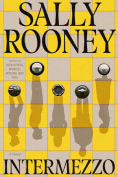Command Performance by Jean Echenoz
 New York. NRYB Classics. 2025. 162 pages.
New York. NRYB Classics. 2025. 162 pages.
And now for something completely madcap.
Or, how would you feel if a shower of heavy bolts from an ancient Soviet satellite fell at thirty yards per second through the atmosphere, to crash-land three blocks from your apartment? Panicked? Laughing with the gods? The protagonist of Jean Echenoz’s Command Performance, who follows the chaos in the street below on his television (better visuals), absorbs it with aplomb. Unfortunately, there were casualties. On the positive side, one such soul was his landlord, so now he won’t have to pony up rent for a couple of months. On the other hand, the neighborhood supermarket has been gutted, and he can’t afford the fancy greengrocer. In any case, he’s not entirely surprised. Over the years, strange things have a history of dropping into his otherwise dull street.
In a screenwriter’s elevator pitch, Command Performance might be described as The Pink Panther meets Veep. Pitches, however, are effective come-ons at best, meant to leave the listener hankering to learn more. For example, that the Pink Panther element is the eponymous (in the French original) hero Gérard Fulmard, proud only of his surname (shared with a seabird), a forty-five-year-old Parisian bachelor who expends much of his psychic energy denying to himself that he is, by any measure, one of life’s expendable losers. The Veep element is just about everyone else in this refreshing and sly, niftily plotted, and entertaining novel.
There’s no trace of any “thinly disguised” authorial self-portrait here. Self-deluded loser is not a label one would dare try on Fulmard’s creator, Jean Echenoz, who in France has circa seventeen mainly best-selling books to his name. Many are “literary,” while others fit nicely on the “genre” shelf, Command Performance included. Who doesn’t sometimes prefer a well-honed thriller to a serious tome? Echenoz, who won the Prix Goncourt in 1999, has nothing left to prove. His varied choices of subject matter follow his fancies. He has published deeply researched, lively portraits of Maurice Ravel, Nikola Tesla, and the Czech Olympic runner Emil Zápotek, the first with the stated aim of capturing the sheen and crackling energy of the all-too-brief period between the two great world wars, the last most likely because Echenoz himself is apparently a passionate runner. This slam-dunk hit with both critics and the public is simply titled Courir (to run).
But back to hapless Gérard Fulmard, our semihero, and the cynical spider trap that soon entangles him, pulling tighter and tighter with every defensive move he makes. Fulmard is in fact not the two-dimensional character he might seem at first glance. He’s an orphan, not only in the sense of having no parents ever since his mother died, leaving him this two-and-a-half-room apartment on a grubby commercial street on the outskirts of Paris, but also in the way that life itself early on turned heel and abandoned him. With no siblings. No friends. No partner, not even the occasional hookup. (He’s 5’6” and balding, chubby, but we know his looks are not the real reason.) He couldn’t afford to pay for sex anyway since, after losing his job as an airline steward under dubious circumstances, he is living on pommes frites and the dole. For all of this, Fulmard is . . . irrepressible. A cheerful optimist! Been down so long, it looks like up to me, as the song says. “With a bright idea and a bit of effort, how can things not get better from here?” seems to be his life’s motto, despite all evidence to the contrary. In a man of forty-five, even if he has only a high school equivalency certificate, this is deep, almost saintly, innocence.
Not absolutely saintly, however, or why did the court, after Gérard’s firing by the airline—bear in mind that it is practically impossible to get fired in France!—require that he see a psychiatrist biweekly? One Dr. François Bardot, to be precise, leather-gloved pilot of an Audi Q2, shrink to the elite, and for his part compelled by the government to minister to a small quota of les misérables. Major plot element here. Major, because Bardot (Echenoz has fun with names) also ministers to one Franck Terrail, founder of the Independent Popular Federation (IFP), a not even thinly disguised send-up of Marine Le Pen’s far-right political machine, albeit far less successful than her current National Rally party at capturing votes. The IFP is a movement fading fast until Terrail’s younger wife and current party head is kidnapped, with photos as proof sent anonymously to all the media, who promptly promote the IFP to page 1.
Another coincidence: both old man Terrail and Fulmard have full-blown crushes on Terrail’s blonde, willowy stepdaughter, Louise. Lazy Louise spends her waking hours swimming laps in the pool of the family manse in the Midi, guarded by Emosthenes and Apollodore, who are not Doberman pinschers as one might suppose but Go-playing Vietnamese brothers tortured by their charge’s casual nudity. Photos thereof have ways of circulating—and of falling out of Terrail’s anthology of Augustan poets, in front of his shrink.
To continue with the Veep element: now that Madame Terrail has been disappeared, and who knows for how long, who should head the party? Echenoz again has infectious fun with a lineup of secondary characters and sycophants all weeping out of one eye and sizing up their rivals with the other. They map neatly onto recent French political figures—or American party strivers, if you can imagine those dressed like blond Guillaume Flax: “sporting white trousers, a yellow carnation, and wide shoulders.” The IFP strivers will also soon be in need of what the Americans would call a fall guy. Why? One must wait to find out. In fact, the plot twists and reverses, toying with the limits of reader exasperation, before Echenoz starts flipping the cards of illumination face up, faster and faster, toward the end.
How can the coincidence of a shared psychiatrist justify the author’s dragging Fulmard into this political swamp? It doesn’t, at least not at first and not directly. What counts most is the location of Dr. Bardot’s office on Rue du Louvre, near a high-perched neon sign that every real-life Parisian has noticed: “Deluc, Detective.” To paraphrase Echenoz: it is place that produces fiction (Le Monde, 2020).
The terse green sign sets Gérard’s optimistic imagination spinning (it sure did mine, on first sighting). Broke and jobless, what has he got to lose by hanging out a shingle of his own: Fulmard Assistance Bureau, Information and Queries (etc.), with a smudgy secondhand diploma nailed over his desk? See what the cat drags in. After a week the cat finally drags in a couple of geezer clients. The clients will turn out to be, surprise, not who they claimed to be. Checks bounce. The shrink, usually clearly bored, appears unusually sympathetic. As for what happens over the next hundred or so pages, it is funny, mordant, occasionally touching, and in the final pages snort-out-loud hilarious, until—. But that would be telling.
Echenoz writes what he wants, ignoring the publishers’ rules about “branding,” and also as he wants, breaking rules as he goes. The word “insouciance” perfectly fits his approach: commencing in the first person, then switching to an omnipotent third-person voice that moreover addresses the reader directly, sometimes with a rhetorical “I don’t know,” only to switch back to Gérard, clearly unaware of the bigger picture. It’s a sort of suspension of the laws of gravity, in both senses. And it works, primarily thanks to Echenoz’s masterful ability to hang a sentence together, a paragraph, a scene. “We’re in the courtyard of a small manor house, where a huge, angular, margarine-colored Volvo resembling an antique dealer’s station wagon has just entered . . . the cockpit is invaded by brutal agricultural stenches—diesel, tractor grease, fertilizer, emanating from the shed, tempered by the more soothing scents—humus, mushrooms, late-blooming roses—drifting in from the surrounding fields.” He puts you there.
Translator Mark Polizzotti, with countless books to his credit, including works by Duras, Breton, and Modiano, has delivered here an English version with the original brio intact. Odd, though, to encounter occasional word choices that seem awkwardly, well, French, or just bewildering, like “tout” for a female bar hustler, “basin” for swimming pool (bassin), or “develops,” for goes on (in conversation). But these are small quibbles.
Certain wines travel better than others. A household name in France, Echenoz is scarcely known in the US. But if a whip-smart escape is what you’re looking for—along with some tips on how to dress—you won’t want to miss Command Performance.
Kai Maristed
Paris





























